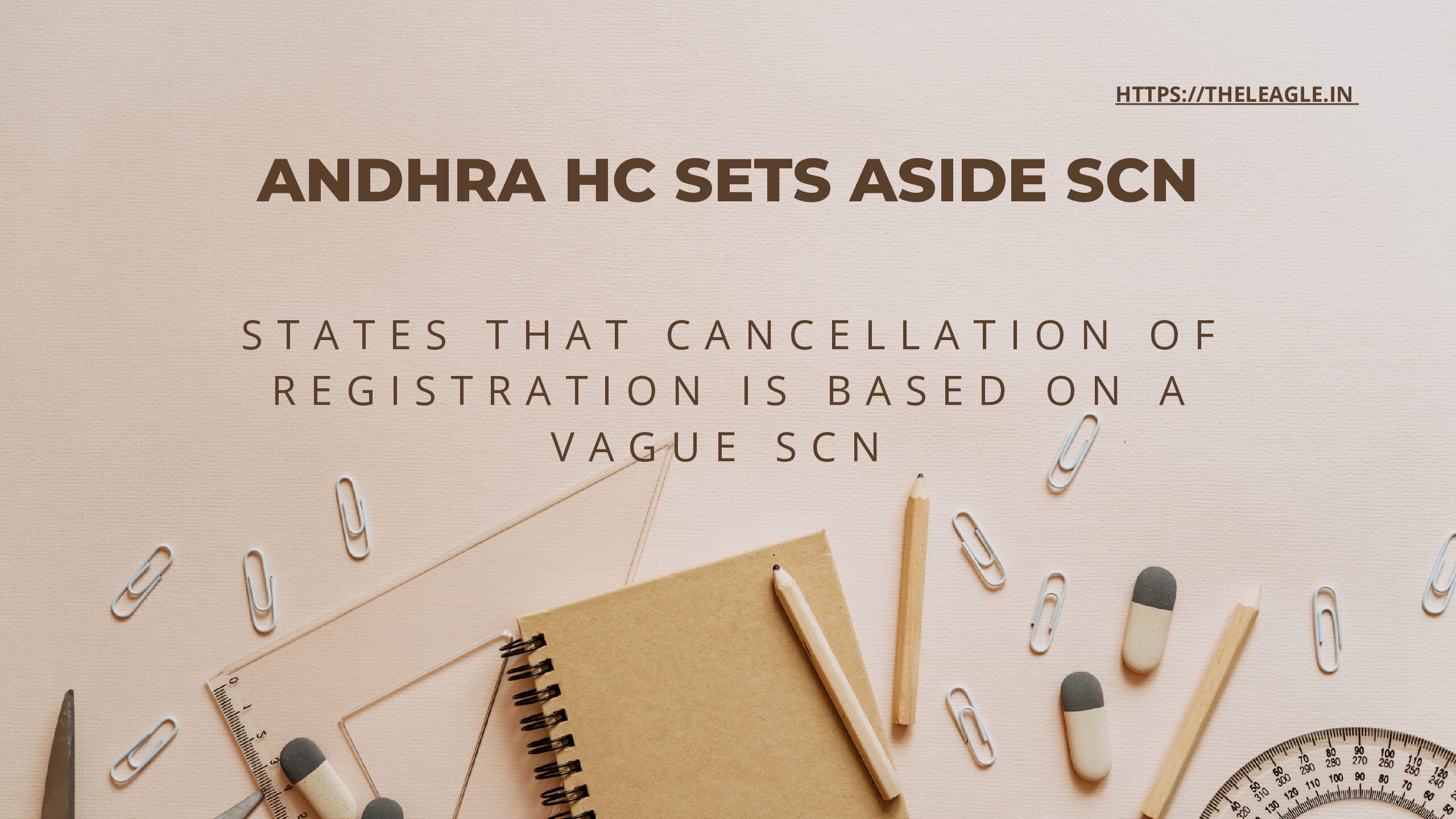The Andhra Pradesh High Court in a recent judgment[1] set aside the showcause notice (‘SCN’) issued by the Revenue Department on the ground that the SCN was vague and dubious. The High court held that the SCN did not contain sufficient details and particulars to enable the taxpayer to reply or file appropriate objections.
Facts
The petitioner in the impugned case, M/s Sakhti Steel Industries Pvt Ltd, was in the business of trading TMT bars, billets and ferrous scrap and importing iron scrap from foreign countries. The parent company of the petitioner, M/s Sakhti Ferroy Alloys Pvt Ltd, manufactured TMT bars and billets. The petitioner used to purchase the TMT bars and billets from its parent company and sell them to various States. The petitioner stated that to maintain better operational efficiency it took on lease vacant land with small builtup area that belonged to its parent company and in a portion of the said premises the parent company also operated. The petitioner had obtained registration in Andhra Pradesh where the said premises were located.
The concerned Deputy Assistant Commissioner visited the business premises of the petitioner and issued a SCN with allegations that the petitioner had obtained registration by ‘fraud, wilful misstatement or misrepresentation of facts’ and the petitioner was asked to file a reply within 7 days. The SCN was issued because the Deputy Assistant Commissioner based on commonality of premises of the petitioner and its parent company concluded that the former had obtained registration by fraud. The petitioner filed a reply denying all allegations of fraud and refuting the fact that its business was not genuine, but the report of Deputy Assistant Commissioner was accepted by the appellate authorities and petitioner’s registration was cancelled. Against the said orders, the petitioner approached the Andhra Pradesh High Court.
High Court Sets Aside SCN
The Andhra Pradesh High Court was precise and unforgiving in its observations about the conduct of the Revenue Department. The High Court cited Section 29, Andhra Pradesh Goods and Services Tax, 2017 and noted that the grounds on which the registration of a taxpayer can be cancelled are specifically enumerated in the provision. Some of the grounds in the provision are: registered taxpayer has contravened any of the provisions of the Act or rules made thereunder, not filing of returns and obtaining registration by fraud, misstatement or misrepresentation of facts. The High Court noted that the SCN issued to the petitioner only mentioned the latter and observed that grounds mentioned in SCN were vague, dubious and did not furnish enough details for the taxpayer to respond to them meaningfully. The High Court added that the purpose of SCN is to state the formal grounds of accusation to enable the accused to reply in satisfaction of principles of natural justice and equity. (para 7) The nature of SCN was enough for the High Court to conclude that principles of natural justice had bene flagrantly violated and that the ‘very foundation for invocation of cancellation is feeble as it has no legal sanctity.’ (para 7)
While the vagueness in the SCN was enough for the Andhra Pradesh High Court to quash it, the High Court nonetheless added that the petitioner in its reply to SCN had stated that it was not involved in any fake business and vouched for the authenticity of its bills and details of all its invoices involving purchases and sales. The petitioner was willing for its records to be scrutinized to disprove allegations of it running a fake business. However, the High Court observed, instead of resorting to such a ‘logical and legal exercise’ the authorities relied on the conjecture of the inspecting authority who suspected the petitioner to be involved in bill trading without movement of goods, for which there was no proper basis. (para 10)
The Andhra Pradesh High Court was thus unsparing in its comments on the Revenue Department’s conduct at the time of issuance of SCN and thereafter. And its observations about the lackadaisical approach of the Revenue Department were certainly not inaccurate.
Conclusion
The Andhra Pradesh High Court adopted a pro-taxpayer approach in the impugned case without detracting from the basic principles of law. It interpreted the relevant provision – Section 29, Andhra Pradesh Goods and Services Tax, 2017 – reasonably to cast a burden on the State to articulate specific grounds of accusation in a detailed manner to enable the taxpayer to respond meaningfully. Merely reproducing the language of the statutory provision in the SCN was not sufficient to prove that the ground for cancellation of taxpayers’ registration were satisfied. And the High Court went further to castigate the authorities to follow a logical path once the taxpayer replies to the SCN instead of merely providing their stamp of approval to the suspicions of the inspecting officer.
[1] M/s Sakhti Steel Industries Pvt Ltd v Appellate Additional Commissioner Sales Tax (Tirupati) TS-496-HCAP-2023-GST.
